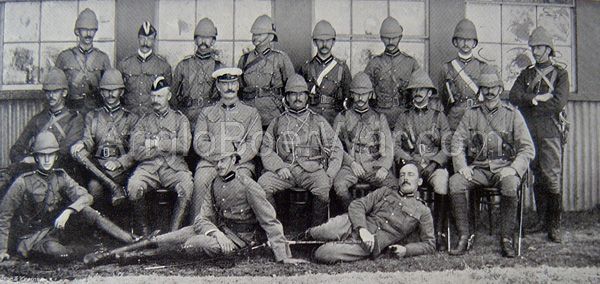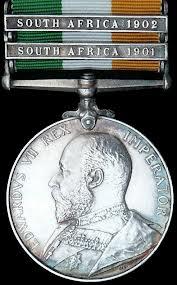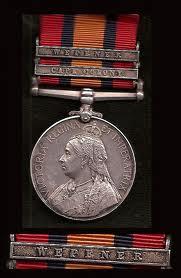Claude joined in November 1900 stating he was 19, another untruth, and that his father lived in Kent, at the time his father was on a Church Mission overseas.
HAROLD JENNINGS SEDGWICK and CLAUDE HAROLD ANNESLEY are the same person.
I bet Claude would never in his wildest imagination think that his past would catch up with him.
From research it would seem that Soldier Number 20333 would have originally enlisted in the King’s Dragoon Guards. At the time of the outbreak of the Boer
War, and Prince of Wales Light Horse Brigade were in Australia.
They returned to South Africa and joined with the King’s Dragoon Guards to form the Prince of Wales Light Horse Brigade
In 1902 he was promoted to Second Lieutenant.
He served with the Army service corp. Their role was to buy the supplies to feed the troops and to run a canteen* see below
In January 1903 he was court martialled and cashiered out of the Army.
Then in August of 1902 he stole in excess of £2000 from the Army Service Corp. I wonder what he was thinking?
How could he spend that amount of money in Pretoria? Did he hope to escape and start a life somewhere new? Well he did, but
first of all he faced a court martial.
When he was promoted to Second Lieutenant, the commission was given by the King. That same commission had to be revoked by
the King after he was found guilty of the charges.
Why was he promoted to Second Lieutant? Probably for some brave action, however, all his Army records were destroyed, as was the case
with anyone who faced Court Martial.
�
Transcripts from Court Martial of Harold Jennings Sedgwick
From the National Archives Kew, England
Judge Advocate General’s Office
7 Victoria Street
Westminister S.W.17 December, 1902
My Lord
I have the honour to enclose the proceeding of the General Court Marshal held for the trial of the Officer named in the margin and I have to acquaint Your Lordship that I have, in a written
communication, submitted to The King my opinion that the Proceeding, Findings and Sentence of the Court were legal.
I have etc,Sd) J. Scott
D.J.A.G.
Commander in Chief.
(Named in the margin 2nd Lieut H.J. Sedgwick, Army Service Corps.
The documents are written on a dark background, probably sepia or parchment, and do not scan very well. The writing style is certainly quite beautiful, and fully legible considering this happened 110 years ago. KH
Journal Entry
Where received Rank Name Regiment Where held Date of trial
Dec 15 2nd Lieut H.J. Sedgwick A.S.C. Pretoria Nov 19
Laid before the King
Nature of Charge Sentence Remitted
Embezzling public money Cashiered Forfeiture of medals
The following information was sent to the King:
Proceedings of a General Court Martial held in the trial of the under mentioned officer most humbly submitted to Your Majesty by
(The Right Honourable, The Judge Advocate General.
2nd Lieut H.J. Sedgwick,
Army Service Corps
Issued at Pretoria
19th November 1902
Charges
First - When charged with the care of public money embezzling the same in that he, at Pretoria on the 3rd October 1902 having received a cheque for Fifteen Hundred Pounds for public purposes,
applied the cash to his own use
Second - When charged with the care of Public money, embezzling the same, in that here, at Pretoria between 15th September 1902 and 4th October 1902, when charged with the care of public
money, having received the sum of Fifty four, Seven Hundred and Forty seven pounds twelve shillings and two pence to cash for public purposes applied Six hundred and three pounds and eight
pence of the above amount to his own use.
Finding
The prisoner 2nd Lieut. H.J. Sedgwick, Army Service Corps is found guilty of all the charges.
Sentence
The Court sentence the prisoner 2nd Lieut H.J. Sedgwick, Army Service Corps, to be Cashiered, and to forfeit the Queen’s South African Medal and three Clasps, and the King’s South African Medal
and two clasps to which he is entitled.
The Deputy Judge Advocate General humbly begs permission to inform Your Majesty that the proceedings, finding, and sentence are in his judgment legal.
In May 1903 he applies for a passport, then according to records arrives in Australia in 1903 as Claude Annesley.
�
Harold Jennings Sedgwick certainly was in the Boer War, but there is no proof of his ever being treated for malaria.
A great many soldiers were however extremely ill with dysentery.
From his service record it indicates he was in the Welsh Regiment and/or 1st Brabant’s Horse.
Roger Nixon my researcher provides the following information:
From Roger Nixon, Researcher in London:
Good News! Far better than I expected.
See attaché with this email four images taken from WO 90/6 which clearly indicate that HJS was court martialed in Pretoria, South Africa on 19 November 1902 (not 1903)
whilst serving as a 2Lt with the Army Service Corps. He was found guilty on embezzling public money and was cashier as a result and all his Boer War Medals were forfeited as
well. The outcome of the trial was entered into the register on December 15 1902 and the matter was also laid before the king as it would have been the monarch who had
granted his commission in the first place.
See also two other emails.
WO 92/3 is effectively a copy of WO 90/6 but WO 91/51 is the actual Report of the trial and contains a lot of detail which I will let you savour in your own time. One thing is
certain, though. Your description of him was bang-on.
Found the attached today in WO 16/104 Enrolments of the Prince of Wales Light Horse on 27 November 1900. He seems to have enrolled firstly in Brabant’s Horse but this
may not have materialized. I think the Welsh Regiment bit is an error. The clerk might have made an assumption based on the Prince of Wales bit. He is shown to have been
commissioned on 18 March 1901 and to have resigned on 30 September 1901. I can only think that he was made an officer with the Prince of Wales Light Horse and then
resigned six months after he was commissioned to possibly obtain a commission in the Army Service Corps.
Now, so happens that a colleague mine has just received a wonderful book about the Prince of Wales Horse. By all accounts the content has been very well researched. I shall
send him detail about Sedgwick this afternoon and he will check the content so see whether any reference to HJS is included and will get back to you with anything if found.






